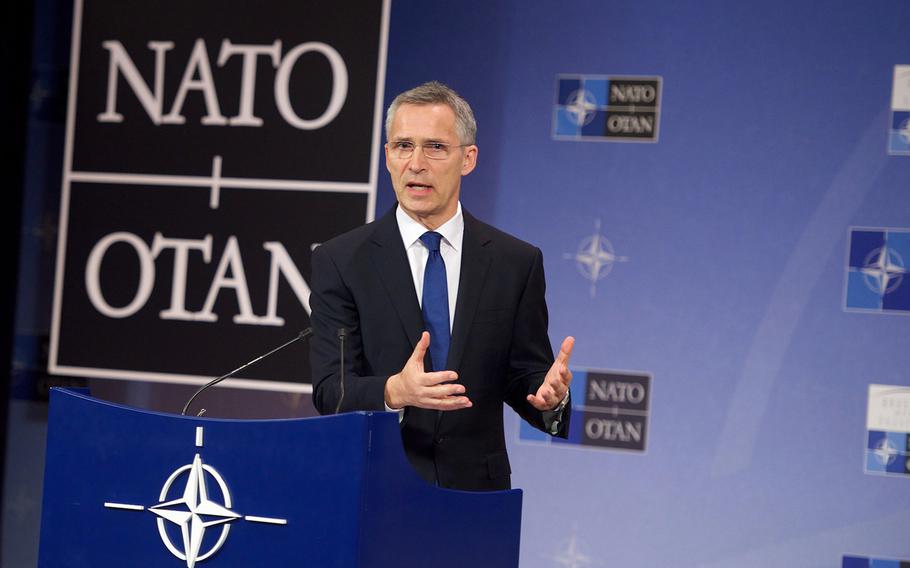
NATO Secretary-General Jens Stoltenberg gives a news conference ahead of the Meeting of NATO Heads of State and Government in Brussels on Wednesday, May 24, 2017. (Courtesy of NATO)
BRUSSELS — On the eve of President Donald Trump’s arrival at NATO headquarters, allies are still debating whether to formally join the U.S.-led coalition against the Islamic State group, a possible sign of reluctance among some members about wading into a battle that the White House has deemed a top priority.
“We are still in discussion whether NATO should become a full member of the global coalition,” NATO Secretary-General Jens Stoltenberg told reporters Wednesday.
Trump has put two issues at the top of his NATO agenda: getting the 28-nation military pact more involved in counterterrorism efforts and pressuring members to dedicate more funds to their own militaries.
Stoltenberg, who welcomed the new Pentagon budget released Tuesday that boosts military spending in Europe, said NATO heads of state will deal with Trump’s key issues during a day of talks Thursday.
All NATO members contribute in different ways to the campaign against the Islamic State group, Stoltenberg said. Short of an agreement to formally join the global alliance, Stoltenberg said he expects an agreement to expand the use of AWACS surveillance aircraft to support the coalition.
Some allies have committed to air-to-air refueling support, a possible sign of NATO inching closer to deeper involvement in the coalition. But it is unlikely NATO’s role against ISIS will develop into an effort like Afghanistan, where the alliance has deployed thousands of troops over the years and is weighing whether to send additional forces.
A decision on more troop contributions for Afghanistan is expected by next month, Stoltenberg said.
Stoltenberg said he anticipates NATO members will agree to develop national plans for meeting defense spending goals, something the Trump administration has demanded from all states. All but five of NATO’s 28 members fall short of a target that calls for dedicating 2 percent of national economic output to military matters.
“These plans will set out how they intend to meet all three aspects of the pledge: cash, capabilities and contributions,” Stoltenberg said. “We will decide that allies will share and report on their progress every year. This will be a new tool. To ensure we keep up the momentum and live up to our commitments.”
Upon Trump’s arrival at NATO’s new headquarters, a sprawling $1.5 billion complex that was under construction for years, ceremonial pomp is expected to be on full display. Trump will dedicate 9/11 memorial with a fragment of the World Trade Center while German Chancellor will dedicate a similar memorial marking the fall of the Berlin Wall.
The one-day summit is the first such gathering since the election of Trump, who has offered blunt criticism about the worth of NATO and questioned its relevance. Trump’s tough talk and overtures to Russia on the campaign trail and after his election has rattled allies. Though Trump’s NATO rhetoric has softened in recent weeks, he is expected to deliver a tough message to members.
In particular, Trump has complained about members such as Germany who fall well short of reaching the alliance’s 2 percent spending benchmark.
Yet while Trump has been critical, NATO’s standing in the U.S. and most of Europe appears to be on the rise since 2015. A new Pew Foundation poll released Tuesday showed that 62 percent of Americans have a favorable view of the alliance, a number roughly equal to the U.K. and France. In Germany, 67 percent have a positive view.
In what could be viewed as an apparent contradiction of his frequent complaint about not wanting to shoulder an unfair portion of the security burden, Trump has increased military support for Europe.
In his 2018 budget, $4.8 billion was marked to fund the European Reassurance Initiative, a $1.4 billion increase over this year. The initiative provides U.S. rotational forces to augment those already stationed in Europe and adds stockpiles of weaponry in a move designed to serve as a deterrent to a more assertive Russia.
Stoltenberg said increased U.S. military support shouldn’t be viewed by allies as a chance to step back from commitments to up their own military investment.
“Increased U.S. military presence does not weaken the need for European allies to invest more in defense,” Stoltenberg said.
vandiver.john@stripes.com Twitter: @john_vandiver